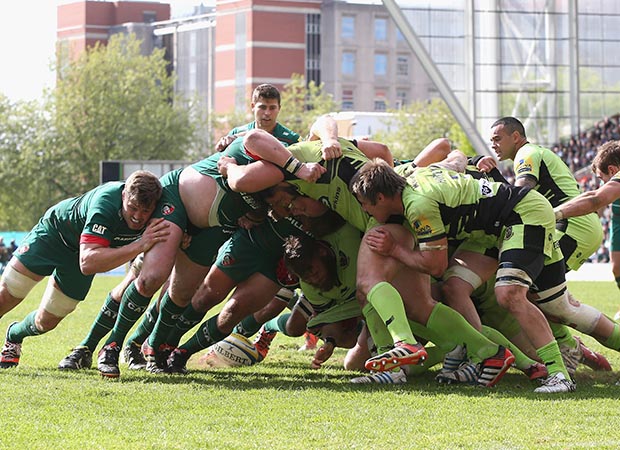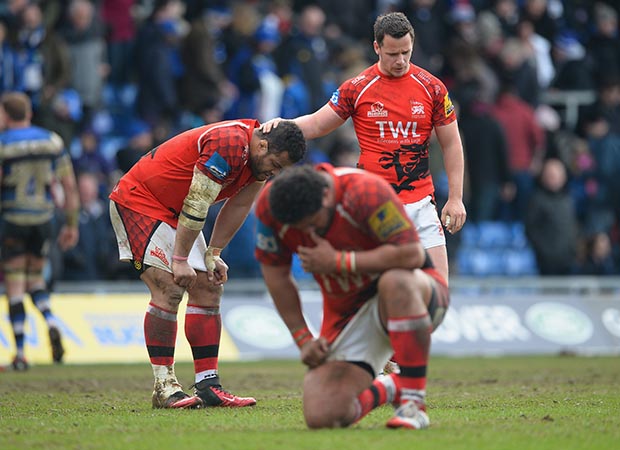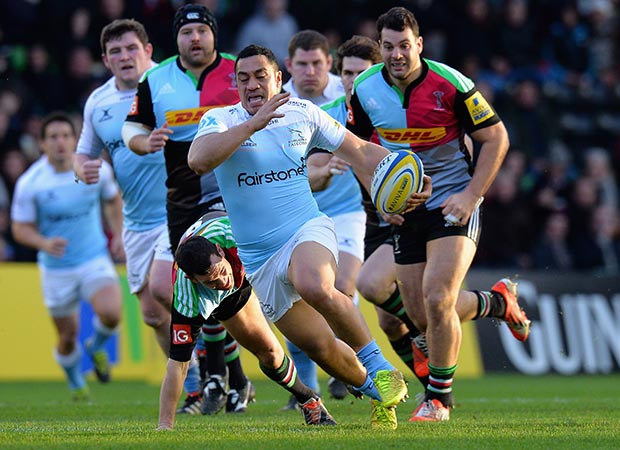 This season as a whole has been very positive, and the attitude of teams in the Premiership will, hopefully, help to inspire the younger generation to play the game. There have been a lot of very close games, and they have been great to watch.
This season as a whole has been very positive, and the attitude of teams in the Premiership will, hopefully, help to inspire the younger generation to play the game. There have been a lot of very close games, and they have been great to watch.
However, there are some negatives, so let's deal with those first. The downside of professional rugby is that relegation is overwhelming in its pressurising of teams that haven't got squads which are able to compete.
There has been a two-tier element to the Premiership table for some seasons with a clear line dividing those teams who can win the title and those looking to avoid relegation.
Those teams who are relegated are facing financial difficulty, and that raises questions over how the funding in the Premiership and the Championship is distributed. It seems obvious to me that every side in the Premiership, including the side promoted from the Championship, should receive the same amount of central funding, which comes mainly from TV revenues. If, in addition, there is a founders' payment, or ‘P shares', then it should be paid to all teams equally, including the promoted team. Funding should be level.
You also have to ask why a number of teams in the Championship are still being given founder-member/P share money as opposed to it being given to the team coming up? That sort of thinking beats me. A club that has left the Premiership, and has not been a part of it for a number of seasons, has done nothing to earn that money.
The dividend to well-established Premiership clubs for the time they have spent in the top league is that their brands, and therefore their commercial income from sponsors, and the size of their gates, gives them a head-start on promoted clubs. That commercial income is clearly their own.
The other serious problem surrounds the scrum. I'm interested to know how much of a negative impact scrum coaches realise they are having on the growth of the game. Sure, gates and TV audiences for Rugby Union continue to increase, but the scrum is a counterweight that can bring those positives crashing down.
Most Premiership coaches appear to be happy with how the scrum is going – and that should be a great concern to the main decision-makers and administrators in the game in England. With so many collapses, resets or penalties it is a mess.
It is also preposterous that all the coaches and referees in the top league have not sat down to sort out this blight.
 However, it is referees who are meant to apply the scrum Laws, and whether or not coaches like it, they should lay those Laws down. There are some that are non-negotiable. The first is that you should put the ball in straight or you will be punished every time. The same applies if your binding is incorrect, if you scrummage at an angle, or if you push before the put-in.
However, it is referees who are meant to apply the scrum Laws, and whether or not coaches like it, they should lay those Laws down. There are some that are non-negotiable. The first is that you should put the ball in straight or you will be punished every time. The same applies if your binding is incorrect, if you scrummage at an angle, or if you push before the put-in.
The scrum also has to be set quicker. At the moment most scrums in the club game look more like a training session involving two packs, with a little conference before they get to work.
One study has shown that setting a scrum takes three times as long as it used to – and ultimately it's because referees are allowing it to happen.
We need to reset the culture of scrummaging, and there should be no leeway when teams contravene those basic scrum Laws outlined above – but it is about referees having the courage and conviction to apply those Laws consistently.
If collaboration between referees and coaches does not work, then it's up to referees to take the initiative and referee the scrum to the letter of the Law. Coaches will bitch and moan, but it's up to referees to stick with it. Coaches will get away with as much as they can, for as long as they can. If referees apply the Laws consistently they will be amazed at how quickly you can achieve a change in scrum culture.
There is a great chance for Rugby Union to grow because this season has been brilliant, and the 2015 World Cup will be massive. However, the entertainment factor that people are starting to demand has to be handled with care. Laws should not be changed simply because of entertainment. People were attracted to the sport from the start because of its variations, and watching two teams striving to win. They found that entertaining, and the same applies now as it did then.
Now, back to those positives.
 In 2013-14 Newcastle Falcons scored 23 tries and finished 11th, whereas this year although they still finished 11th they scored 57. That sums up how the season has gone. The game was in danger of being overrun by defensive systems, but the emphasis between attack and defence has been rebalanced with everyone advancing on the attacking front apart from Leicester, who managed only 37 tries.
In 2013-14 Newcastle Falcons scored 23 tries and finished 11th, whereas this year although they still finished 11th they scored 57. That sums up how the season has gone. The game was in danger of being overrun by defensive systems, but the emphasis between attack and defence has been rebalanced with everyone advancing on the attacking front apart from Leicester, who managed only 37 tries.
The side which showed the greatest ability to transition from firm defence to strong attack was Saracens. They were criticised for being limited, but I don't buy that. They scored 70 tries and also had the best points difference. If you want to play more without the ball than with it, that's your choice, and no-one can deny how effective their low risk, pressurising game was, or how dangerous their counter-attacking was.
However, in recent seasons the Premiership has produced champions who are all slightly different. Saracens have not been winning the title time and again, with Harlequins, Leicester and Northampton also getting their hands on the trophy in the last five seasons. So, the Saracens system is not foolproof.
The way to beat Saracens is to kick better than them, and to counter-attack better than them. Bath did not get it tactically wrong in last weekend's Premiership final, but they executed poorly under pressure. Saracens made delivery of the pass more difficult than they were used to, and two of their tries came as a consequence of bad Bath execution in attack. Bath won the second-half 13-3, but by then the damage was done.
It was a fitting finale to a great season. It was fast-paced and demanded your attention – and you can only admire the precision in the Saracens game. For instance, their first try, scored by Owen Farrell, was part of a multi-phase attack which was skilful, quick, efficient and effective. It summed them up, and they are worthy champions.
The Premiership's shift towards attack may be explained by a good winter and by most clubs now having pitches that are well-prepared and fast. It was competitive and enjoyable, and for that everyone in the league should be congratulated.


























